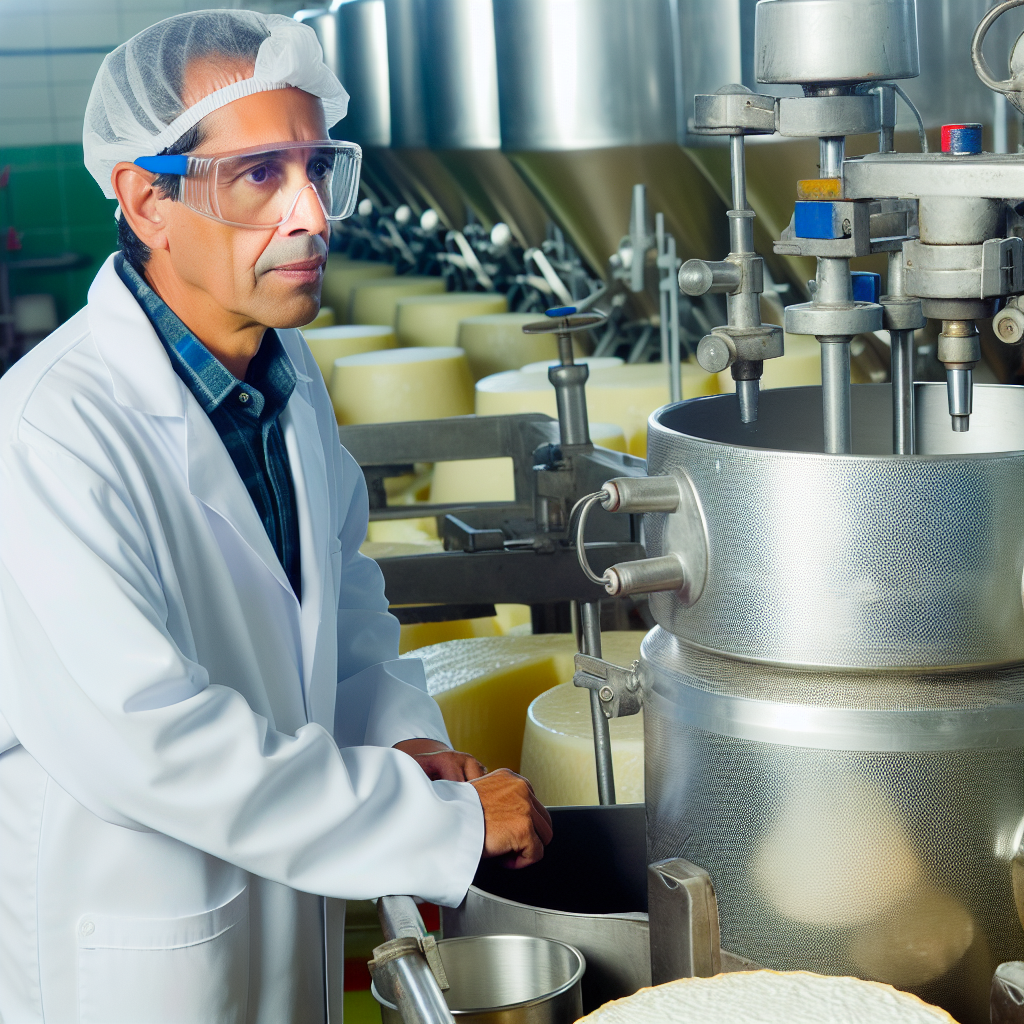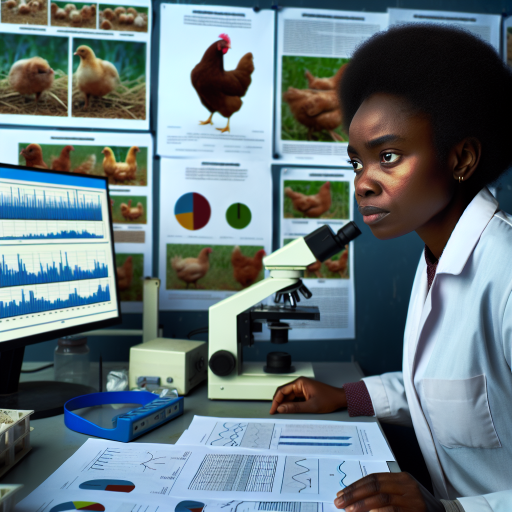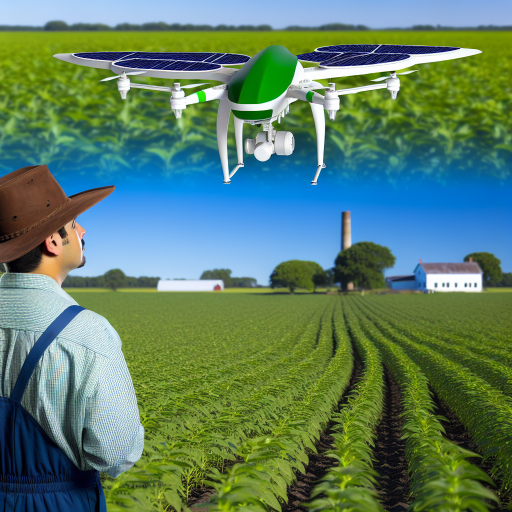Introduction:
Dairy scientists play a crucial role in the process of cheese production.
They are responsible for ensuring the quality and safety of cheese products.
Understanding Cheese Production:
Dairy scientists are involved in every stage of cheese production.
This includes sourcing raw materials to packaging the final product.
Quality Control and Assurance:
One of the key responsibilities of dairy scientists is to monitor and maintain quality standards.
Research and Development:
Dairy scientists also conduct research to improve cheese production processes.
They work to develop new cheese varieties.
Testing and Analysis:
They use various analytical techniques to assess cheese characteristics.
This includes composition, flavor, and texture to ensure product consistency.
Regulatory Compliance:
Dairy scientists work closely with regulatory bodies.
They ensure that cheese products meet all safety and quality standards.
Collaboration with Industry Partners:
They collaborate with cheese manufacturers and suppliers.
This helps address any issues that may arise during production.
Continuous Improvement:
Overall, dairy scientists play a critical role in the cheese production industry.
They ensure continuous improvement in product quality and safety.
Research and Development:
Dairy scientists play a crucial role in the cheese production industry.
One of their key responsibilities is to conduct research and development activities to enhance the cheese-making processes.
This involves studying the various factors that influence the quality, texture, flavor, and shelf life of cheese.
By conducting thorough research, dairy scientists can identify areas for improvement and develop innovative techniques to optimize cheese production.
- Conducting research to improve cheese-making processes
- Developing new techniques for cheese production
Exploring New Ingredients:
Transform Your Career Today
Unlock a personalized career strategy that drives real results. Get tailored advice and a roadmap designed just for you.
Start NowIn their quest for innovation, dairy scientists are constantly exploring new ingredients that can be used in cheese production.
They conduct experiments to test different types of milk to determine the impact on cheese quality.
Additionally, they experiment with various cultures and enzymes to find the perfect combination that will result in the desired characteristics of the cheese.
- Testing different types of milk for cheese production
- Experimenting with various cultures and enzymes
Optimizing Cheese-Making Processes:
Dairy scientists are also involved in studying fermentation and aging techniques to understand their effects on cheese quality.
By optimizing these processes, they can ensure that cheese products meet the desired standards consistently.
Moreover, dairy scientists work on improving the efficiency of cheese manufacturing by streamlining production methods and reducing waste.
- Studying fermentation and aging techniques
- Improving the efficiency of cheese manufacturing
Quality Control and Assurance:
Another important aspect of a dairy scientist’s involvement in cheese production is quality control and assurance.
They are responsible for implementing quality control measures throughout the cheese-making process to maintain product consistency and safety.
Dairy scientists also ensure that cheese production facilities comply with food safety regulations to guarantee the quality of the final product.
- Implementing quality control measures in cheese production
- Ensuring compliance with food safety regulations
Collaboration with Cheese Makers:
Dairy scientists collaborate closely with cheese makers to test new ideas and concepts.
They provide technical support and guidance to cheese makers to help them troubleshoot issues and improve their production processes.
By working together, dairy scientists and cheese makers can push the boundaries of cheese production and create innovative products that meet consumer demand.
- Working closely with cheese makers to test new ideas
- Providing technical support and guidance in cheese production
Quality Control:
Monitoring cheese production to ensure quality standards are met.
Implementing quality control measures to maintain consistency in cheese production.
Maintaining quality control in cheese production is crucial for dairy scientists.
They play a vital role in ensuring that the cheese produced meets the highest standards of quality and taste.
One of the key responsibilities of a dairy scientist in cheese production is to closely monitor the entire process.
Transform Your Career Today
Unlock a personalized career strategy that drives real results. Get tailored advice and a roadmap designed just for you.
Start NowThis includes overseeing the selection of raw materials, the fermentation process, and the aging of the cheese.
By closely monitoring each stage of cheese production, dairy scientists can identify any potential issues that may arise.
This proactive approach helps prevent quality issues before they impact the final product.
In addition to monitoring, dairy scientists also implement quality control measures to maintain consistency in cheese production.
This involves setting and executing strict protocols for each step of the process.
For example, dairy scientists establish specific guidelines for ingredient quantities, temperature control, and production timelines.
By adhering to these measures, they can ensure that each batch of cheese meets the same high standards.
Implementing quality control measures also involves conducting regular inspections and tests throughout the production process.
This includes sensory evaluations, physical assessments, and chemical analyses to confirm that the cheese meets predetermined quality criteria.
Furthermore, dairy scientists work closely with production teams to address any deviations from established protocols.
By providing feedback and guidance, they help maintain consistency and address any issues that may impact the final product.
Quality control is a critical aspect of cheese production that dairy scientists take very seriously.
Their attention to detail and commitment to maintaining high standards ensures that consumers enjoy delicious and top-quality cheese products.
Delve into the Subject: Grape Breeding and Genetic Research
Ingredient Selection:
When it comes to cheese production, selecting the best ingredients is crucial for achieving a high-quality product.
Dairy scientists play a key role in this process, working closely with suppliers to ensure that only the finest ingredients are used.
- Choosing the right type of milk is the first step in ingredient selection.
- Dairy scientists evaluate different sources of milk, such as cow, goat, or sheep, to determine which will yield the desired flavor and texture for the cheese being produced.
- Aside from milk, other key ingredients in cheese production include cultures, rennet, and salt.
- Dairy scientists carefully select these components based on the specific requirements of the cheese being made, taking into account factors such as acidity, flavor development, and texture.
- Working with suppliers is another crucial aspect of ingredient selection.
- Dairy scientists collaborate with trusted suppliers to ensure that the ingredients meet stringent quality standards and are free from any contaminants or impurities that could affect the final product.
- By maintaining close relationships with suppliers, dairy scientists can stay informed about any changes or updates in ingredient availability or quality, allowing them to make adjustments as needed to maintain the consistency and excellence of their cheese products.
- Overall, ingredient selection is a meticulous process that requires careful consideration and attention to detail.
- Dairy scientists leverage their expertise and knowledge to choose the best ingredients for cheese production, ultimately contributing to the success and quality of the final product.
Dairy Scientists Impact on Cheese Quality
The involvement of dairy scientists in cheese production is essential for creating delicious and high-quality cheese products.
From overseeing milk quality to selecting the finest ingredients, dairy scientists play a critical role in every stage of the cheese-making process.
By utilizing their expertise and experience, dairy scientists ensure that cheese production meets the highest standards of quality and consistency.
Their dedication to excellence and attention to detail contribute to the success of the dairy industry and the enjoyment of cheese lovers worldwide.
Transform Your Career Today
Unlock a personalized career strategy that drives real results. Get tailored advice and a roadmap designed just for you.
Start NowYou Might Also Like: The Future of Food Science: Trends to Watch
Production Process:
Dairy scientists oversee the cheese-making process from start to finish.
They troubleshoot any issues that arise during production to ensure quality.
Preparing Ingredients:
Dairy scientists carefully select and measure all ingredients needed for cheese production.
They ensure that the milk, cultures, rennet, and other additives meet quality standards.
Coagulation and Curd Formation:
Dairy scientists monitor the coagulation process closely to achieve the desired curd texture.
They adjust the temperature and time factors to control the coagulation process effectively.
Cutting and Draining Curd:
Dairy scientists determine the ideal curd size and cut it accordingly for proper drainage.
They regulate the drainage time to achieve the desired moisture content in the curds.
Pressing and Shaping:
Dairy scientists oversee the pressing of curds into molds to form the cheese shape.
They adjust the pressure and time of pressing to achieve the desired texture and consistency.
Ripening and Aging:
Dairy scientists monitor the cheese aging process to develop its flavor and texture.
They control factors such as temperature, humidity, and time to ensure proper aging.
Quality Control:
Dairy scientists conduct quality checks at each stage of the cheese-making process.
They perform sensory evaluations and laboratory tests to maintain consistent quality standards.
Packaging and Storage:
Dairy scientists determine the appropriate packaging materials and methods for each cheese variety.
They establish storage conditions to preserve the cheese’s freshness, flavor, and shelf life.
Troubleshooting:
Dairy scientists troubleshoot any issues that arise during the cheese-making process.
They use their expertise to identify and resolve problems quickly to avoid quality issues.
You Might Also Like: Extension Agents’ Role in Food Systems
Transform Your Career Today
Unlock a personalized career strategy that drives real results. Get tailored advice and a roadmap designed just for you.
Start NowCollaboration with Cheesemakers:
Dairy scientists play a crucial role in working closely with cheesemakers throughout the cheese production process.
They provide expertise and guidance on cheese production techniques to ensure high-quality and consistent results.
By collaborating with cheesemakers, dairy scientists can help achieve desired outcomes such as flavor, texture, and appearance of the cheese.
Dairy scientists work hand in hand with cheesemakers to troubleshoot any issues that may arise during the production process.
Their involvement helps to optimize production efficiency and minimize waste, leading to cost savings for the cheesemakers.
Through collaboration, dairy scientists can assist cheesemakers in implementing new technologies and innovation in cheese production.
They also help cheesemakers navigate regulatory requirements and ensure compliance with food safety standards.
By sharing their knowledge and experience, dairy scientists empower cheesemakers to continuously improve their craft and remain competitive in the market.
The close collaboration between dairy scientists and cheesemakers fosters a culture of learning and innovation within the dairy industry.
The partnership between dairy scientists and cheesemakers is essential for the success and growth of the cheese production industry.
Learn More: Effective Communication in Agricultural Marketing

Sustainability Practices
Implementing sustainable practices in cheese production is essential.
It helps in reducing environmental impact and ensures long-term viability for the industry.
One of the key aspects of sustainable practices in cheese production is reducing waste.
This can be achieved by optimizing production processes, such as reducing energy consumption.
Implementing recycling programs for byproducts is also crucial.
Another important aspect is improving the environmental impact of cheese production.
This can be done by minimizing water usage and reducing greenhouse gas emissions.
Sourcing ingredients from sustainable suppliers is essential for better impact.
Implementing sustainable practices requires collaboration among dairy scientists, cheese producers, and other stakeholders.
Transform Your Career Today
Unlock a personalized career strategy that drives real results. Get tailored advice and a roadmap designed just for you.
Start NowBy working together, innovative solutions can address environmental challenges.
It also ensures a sustainable future for cheese production.
Some specific sustainable practices that dairy scientists can implement include:
- Using renewable energy sources for cheese production
- Implementing water conservation techniques in cheese processing
- Reducing packaging waste through eco-friendly packaging materials
- Promoting animal welfare standards in dairy farming
Focusing on sustainability practices allows dairy scientists to contribute to the long-term success of the cheese production industry.
It also reduces its environmental footprint.
Prioritizing sustainability in cheese production is crucial for a more sustainable future.
Compliance with Regulations:
In the world of cheese production, dairy scientists play a crucial role in ensuring that the process complies with various regulations.
It is essential to adhere to both local and federal regulations to guarantee the safety and quality of the cheese products being produced.
Local Regulations:
Dairy scientists must be well-versed in the specific regulations set forth by the local government where the cheese production facility is located.
These regulations may vary from one region to another and could include requirements related to sanitation, labeling, and waste disposal.
Federal Regulations:
In addition to local regulations, dairy scientists must also ensure that cheese production meets federal standards.
These regulations are set by agencies such as the Food and Drug Administration (FDA) and the United States Department of Agriculture (USDA) and cover aspects such as food safety, labeling, and ingredient requirements.
Staying Up-to-Date:
It is not enough for dairy scientists to simply be aware of existing regulations; they must also stay up-to-date on any changes or updates to food safety guidelines and industry standards.
This involves actively following developments in the field, attending training sessions, and participating in industry conferences.
Ensuring Compliance:
Dairy scientists play a critical role in ensuring that the cheese production process complies with all relevant regulations.
This includes overseeing the production environment, monitoring processes, and conducting regular audits to verify compliance with local and federal requirements.
Adapting to Changes:
Regulations and standards in the food industry are constantly evolving to address new challenges and technological advancements.
Dairy scientists must be prepared to adapt to these changes and implement any necessary updates to ensure continued compliance with regulations.
Impacts of Dairy Scientists on Cheese Production
Dairy scientists play a critical role in cheese production.
Their expertise in microbiology, chemistry, and food science is essential for ensuring the quality, safety, and consistency of cheese products.
Transform Your Career Today
Unlock a personalized career strategy that drives real results. Get tailored advice and a roadmap designed just for you.
Start NowThey are involved in every stage of the cheese-making process.
This includes stages from milk collection to packaging.
Their work helps maintain high standards and meet regulatory requirements.
Without their dedication and knowledge, the cheese industry would struggle.
Consumers enjoy a diverse range of products because of their efforts.
The work of dairy scientists directly impacts cheese quality.
Their research and innovation contribute to new varieties, flavors, and textures.
They enhance the overall experience for cheese lovers worldwide.
By staying informed about technologies and advancements, dairy scientists push the boundaries of cheese production.
This ensures cheese remains a staple in households and restaurants alike.
Additional Resources
Federal testing on more retail dairy products finds no live H5N1 virus …
[E-Books for Sale]
The Big Book of 500 High-Paying Jobs in America: Unlock Your Earning Potential
$19.99 • 500 High-Paying Jobs • 330 pages
Explore 500 high-paying jobs in America and learn how to boost your career, earn more, and achieve success!
See All 500 High-Paying Jobs of this E-Book
1001 Professions Without a Degree: High-Paying American Jobs You Can Start Now
$19.99 • 1001 Professions Without a Degree • 174 pages
Discover 1001 high-paying jobs without a degree! Unlock career tips, skills, and success strategies for just $19.99!




